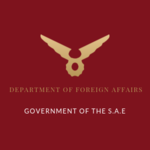Department of Foreign Affairs (Second American Empire)
| Department of Foreign Affairs | |
|---|---|

| |
| Established | 26 December 2020 |
| Headquarters | Imperial Capital |
| Minister of Foreign Affairs | Raja Balaji, Secretary of Foreign Affairs |
The Secretary of the Department of Foreign Affairs is responsible for assisting and advising the Emperor and Autocrat with developing and periodically reviewing the Empire’s Foreign Policy. The Minister is required to advise the Emperor and Autocrat of situational developments in the micronational world and how these may affect America. The Minister oversees the implementation of America's Foreign Affairs activities, in particular assisting the Emperor by initiating and nurturing relationships that relate to negotiations of treaties and economic trade deals with other micronations.
When and where practical, the Secretary of the Department of Foreign Affairs will promote the establishment of American Embassies and Consular representations within recognized micronations. The Secretary will assist and advise the Emperor and Autocrat with processing formal requests from recognized micronations for the establishment of foreign Embassies or Legations within America.
These duties and responsibilities promote the status and prestige of the Second American Empire on the micronational world stage and demonstrate the high ethical, moral, and philosophical standards of benevolent governance that motivate and inspire the Emperor and Autocrat of America.
Current Foreign Policy
The Second American Empire currently follows a Policy of recognizing all Micronations as being legitimate countries and nation-states. The Second American Empire is currently open to accepting all Treaties of Mutual Recognition, Alliances, and Economic Treaties which might be presented to the Department of Foreign Affairs.
The Empire currently claims Imperial State Capital, Northwest Ordinance, Imperial State of Cascadia, and Texan Federation as to our constituent territory. The Empire plans to make territorial expansions and will ensure they do not violate any micronational conventions or impose upon another micronations territory.
As for the matter of war, the Empire views micronational wars to be completely pointless and contrary to the founding principles of the Empire, and therefore we will refuse to participate in any war, and will not recognize any war declared upon us.
America also makes an active effort to avoid relations with members of the GUM. Due to an unfortunate toxic environment within the organization.
Requirements for Diplomatic Relations
Your email should contain:
- Name of your Micronation
- Name/Title of the Head of State
- Expected relationship with America
- Brief history of your Micronation
- Link to one of the following:
- MicroWiki Page
- Website
- Micronation must be at least 6 months old
The Empire will undertake research into your state and should your state match up to our current social and political stance then the Emperor and Autocrat will prepare a Treaty of Mutual Recognition to present to you.
MFTA (Micronational Free Trade Agreement)
The Second American Empire founded the MFTA (Micronational Free Trade Agreement) (MFTA), and the primary purpose of the Agreement is to maintain trade wars and between the various micronations and to that end take preventative measures and remove threats which would threaten this.
All micronations are eligible to join the Agreement, there are no waiting periods, and all forms of government are recognized. The House of Deputies discusses and votes on each Application via democratic principles and each discussion is done in a fair and open manner to ensure each micronation who applies for membership is given an equal chance.
How Does The MFTA Function?
President of the Micronational Free Trade Agreement
- The Office of the President is forever to be held by the Head of State of the Second American Empire.
- The main responsibility of the President is to present Membership Applications to the House of Deputies. The President is able to vote on said Membership Applications however the Charter formally bars the President from being able to vote in any legislation presented to the House of Deputies, except in cases of a draw.
House of Deputies
- The House of Deputies is made up of every Full Member State and the President. Member Countries present legislation to be debated and argued and voted on. This legislation can relate to any topic and can be anything. As the Chamber is democratic each piece of legislation is discussed openly and fairly to ensure each Member State's voice is heard.
- The Chamber of Delegates also has the responsibility of discussing each Membership Application and discussing and voting on said application. This action forms the very Foundation of the Agreement.
Supreme Court
- The Supreme Court is independent of the rest of the Organisation and is responsible for investigations against the Member States should they found to have violated either the Charter international law. The responsibility of the Court also expands to the enforcement of the Agreement laws and rules.
- However the Supreme Courts' greatest responsibility is that of territorial dispute, as the agreement grows it will become expected that micronations may have overlapping territorial claims, and this could lead to disputes. This is why the Supreme Court was given independent authority to help resolve these issues.